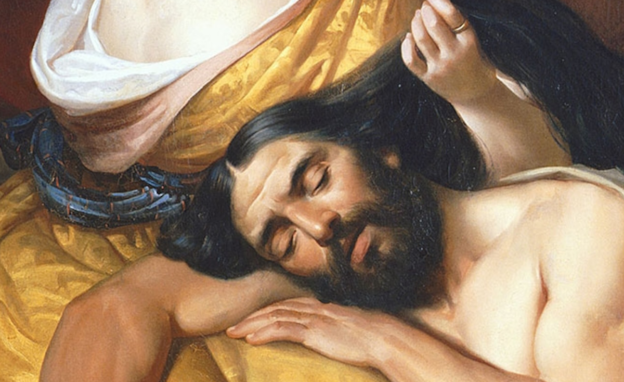Sometimes in life, a person and the events that occur to them ends up being a picture of a group they belong to. In Jesus’ parables, figures like the older brother stood quite clearly for the life and attitude of the Pharisees.
Samson’s life also served as a picture of Israel. His sinful life, expectation of God’s presence, and his downfall mirrored that of Israel in its relationship with God. It reminds us that as individuals, as a congregation, and as a church, we must watch our lives and keep them focused on Christ.
After avenging himself on the Philistines for the death of his wife, Samson is said to have judged Israel for twenty years (15:20). Yet what sort of leadership did Samson provide?
The first portion of chapter 16 suggests that it was not a particularly dignified and holy leadership. Samson had a weakness for women, especially the Philistine variety. His weakness led him in unsavoury directions.
Firstly, they led Samson to sinfully engaging the services of a Philistine prostitute (16:1). While there, the local Philistines saw an opportunity to get their man (v.2). But Samson again embarrassed the Philistines by recognising the prospect of an ambush, sneaking away, and removing the Gaza Gates to a hill near Hebron while he was at it (vv.3-4). They could do nothing against his strength, it literally left them defenceless.
Besides indicating Samson’s tendency to indulge his lust, this second episode introduces a pattern of weakness which brings Samson’s downfall. Eventually, Samson’s eyes fall upon Delilah (v.4), who is paid 1,100 pieces of silver to seduce and betray Samson to them (v.5).
Samson’s weakness for Philistine women led him to Delilah, who would make Samson weak so the Philistines could overcome his strength.
Delilah questioned Samson as to what made him strong (v.6). Samson lied, suggesting seven fresh bowstrings binding him would make him weak (v.7). But when Delilah tied him up and invited in the Philistines, he snapped the strings like a twig and defeated them (vv.8-9).
So Delilah tried again. Samson shows his weakness and stupidity when it comes to pretty women by either not sniffing a secret agenda, or not caring. Thus a repeat with fresh ropes, and the same result (vv.10-12).
So Delilah tried again. Samson got closer to the truth this time, his guard getting lower when it should be getting higher. He mentioned his hair, suggesting weaving and pinning it would weaken him like any other man (vv.13-14). Same result.
So Delilah tried again. This time, she preyed on his weakness suggesting he did not truly love her because he kept secrets from her (v.15). She pressed him day after day, vexing his soul to death (v.16).
Alarm bells should have been ringing. The only thing ringing was his lust. He gave in for some peace on the home front. He told her the truth about the Nazirite vow, and the one part which had not yet been broken – his unshaven hair (v.17).
The deed was done. The Philistine lords warned and the money brought (v.18). She made him fall asleep on her knees, and his hair was shaved (v.19). He thought everything would be fine this time, as it had before, but his strength had left him with his hair (v.20) and the Philistines seized him like they could never before (v.21).
They blinded him by gouging out his eyes, and set him to work grinding grain with a hand mill in Gaza (v.21). The bester and humiliator of Philistines so many times, bested and humiliated himself. The downfall was complete.
But the story was not over yet. His hair began to grow again (v.22).
Samson presumed upon God’s grace and favour. He assumed that God would continue to remain with him, despite his sinful life and ultimately breaking every vow of a Nazirite. God could have left him at any point until this point in the text, yet because of God’s grace to Samson and Israel he remained with him until his hair fell onto the floor.
Israel, likewise, presumed on God’s grace, chasing after foreign gods and assuming God would dig them out of trouble time and again. It was their downfall, just as it was Samson’s.
We must examine our lives. Do we depend on God or presume on him? Do we seek to keep his commands, or break every one? Are we empowered by God’s Spirit or “wretched, pitiable, poor, blind, and naked” (Rev. 3:17)? If the latter, we should repent before we too find ourselves humiliated and defeated by the world and sin, brought down by our sinfulness and weakness for lusts of this world.
Yet as we fail to do so perfectly, or at all and fall, the final verse reminds us that this does not have to be our end. If we repent, our spiritual “hair” may grow back, because while we live forgiveness in Jesus is still available. God is long-suffering in his grace.


